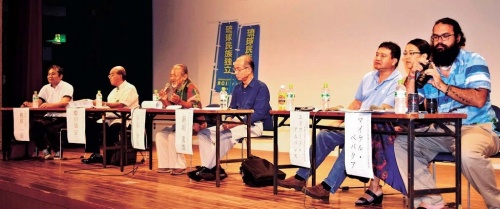Symposium on Ishigaki Island’s future, independence, base issues, and peace

Scholars discuss on peace and Ryukyu's independence at a symposium held by the Association of Comprehensive Studies for Independence of the Lew Chewans (ACSILs) at Ishigaki Island on October 24
October 25, 2015 Ryukyu Shimpo
On October 24, in Ishigaki Citizen Hall, the Association of Comprehensive Studies for Independence of the Lew Chewans (ACSILs) opened a symposium to address peace and Ryukyuan independence. A panel of officials from the Yaeyama Islands and Guam exchanged views on the Japan Self Defense Force (SDF)’s deployment plans, U.S. military base issues in Okinawa, and related topics. The panel affirmed the importance of deepened regional discussion and self-determination, and sharing views with the international community.
Shigeo Aragaki, member of the ACSILs and co-representative of the Islanders’ Council for Considering Ishigaki’s Future, raises the point that it is essential to make great efforts to avoid turning to the method of war. Moreover, touching on a history of discrimination against Okinawa, he attests that at the signing of the Treaty of San Francisco, Okinawans’ views went unheard, and Okinawa is now dealt with dismissively. He appealed to listeners, saying that problems with SDF deployment will occur in Ishigaki unless we unite to prevent it.
Edward Alvarez, executive director of Guam’s Commission on Decolonization, says “both Guam and Okinawa can be referred to as colonies,”. He pointed out that Okinawa receives treatment deserving of placement on the UN list of non-self-governing territories. If placed on the list, Alvarez suggests that it will be possible to make the case to the international community that Okinawa is receiving unjust treatment by being kept from exercising its autonomy.
Kinsei Ishigaki, representative of the Council to Revitalize Iriomote Island, and Michael Bebiakua, associate professor at the University of Guam, also presented their views on the topic.
In advance of the panel discussion, Taketomi Town’s former superintendent of education, Anzo Kedamori, presented a keynote speech, in which he shared his own war experiences and discussed the textbook controversy in Yaeyama. The textbook controversy involved the government interfering with the history being taught in schools. He emphasized the importance of self-determination over national government imposition with the following words: “There is no such thing as a good war. Peace studies are coming to understand that a state of affairs where frail people can live happily means we have good society. This kind of thinking opposes the writing of textbooks that mold a national consciousness with willingness to consider going to war.”
(English translation by T&CT and Erin Jones)
Previous Article:Kenzaburo Oe and 23 other artists and intellectuals release statement supporting governor’s revocation of Henoko land reclamation permit
Next Article:[Extra] OPG lodges complaint regarding disputed landfill for new US base
[Similar Articles]
- Symposium commemorating the designation of the Kerama Islands as a national park
- Okinawa 10/10 Air Raid banished from high school textbooks approved by government
- Ryukyu Shimpo article “Okinawa Rail Released” used in fifth grade Japanese language textbook
- Forced mass suicides to be mentioned in high school textbooks
- Symposium to discuss the significance of Okinawa’s reversion to Japanese sovereignty held in Tokyo
 Webcam(Kokusai Street)
Webcam(Kokusai Street)


